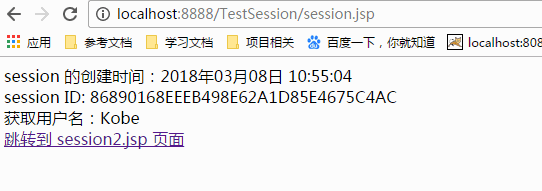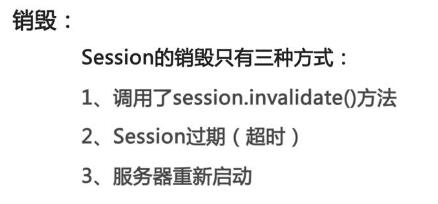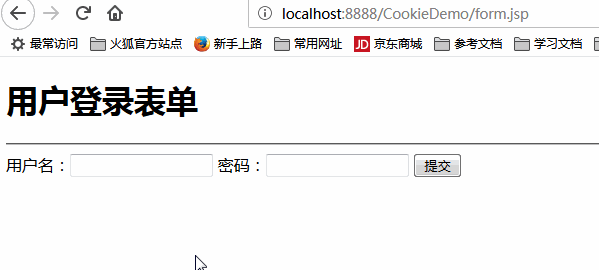Http 协议的无状态性
无状态是指,当浏览器发送请求给服务器的时候,服务器响应客户端请求。但是同一个浏览器再次发送请求给服务器的时候,服务器并不知道它就是刚才那个浏览器
session
- session表示客户端与服务器的一次对话
- Web中的session指的是用户在浏览某个网站时,从进入网站到浏览器关闭所经过的这段时间,也就是用户浏览这个网站所花费的时间
- 从上述定义中可以看到,session实际上是一个特定的时间概念
在服务器的内存中保存着不同用户的session,也就是说每一个用户对应着一个session,不同的用户对应着不同的session

- session 对象是一个JSP内置对象
- session对象在第一个JSP页面被加载时自动创建,用来完成会话期管理
- 从一个客户打开浏览器并连接到服务器开始,到客户关闭浏览器离开这个服务器结束,被称为一个会话
- 当一个客户访问一个服务器时,可能会在服务器的几个页面之间切换,服务器应当通过某种办法这是一个客户,就需要session对象
- session对象是HttpSession类的实例
session 对象常用方法:
- long getCreationTime(): 返回 session 创建时间
- public String getId(): 返回 session 创建时,JSP 引擎为它设的唯一ID号
- public Object setAttribute( String name, Object value): 使用指定名称将对象绑定到此会话
- public Object getAttribute( String name ): 返回与此会话中的指定名称绑定在一起的对象,如果没有对象绑定在该名称下,则返回 null
- String[] getValueNames(): 返回一个包含次此 session 中所有可用属性的数组
- int getMaxInactiveInterval(): 返回两次请求间隔多长时间此 session 被取消(单位:秒)
<%@ page language="java" import="java.text.*, java.util.*" contentType="text/html; charset=utf-8" pageEncoding="utf-8"%> <!DOCTYPE html PUBLIC "-//W3C//DTD HTML 4.01 Transitional//EN" "http://www.w3.org/TR/html4/loose.dtd"> <html> <head> <meta http-equiv="Content-Type" content="text/html; charset=utf-8"> <title>Insert title here</title> </head> <body> <% SimpleDateFormat sdf = new SimpleDateFormat("yyyy年MM月dd日 hh:mm:ss"); Date d = new Date(session.getCreationTime()); session.setAttribute("username", "Kobe"); %> session 的创建时间:<%=sdf.format(d) %><br> <%--session.getCreationTime() 返回的是一个毫秒数 --%> <%--new Date(session.getCreationTime()) Thu Mar 08 09:57:56 CST 2018 --%> session ID: <%=session.getId() %><br> 获取用户名:<%=session.getAttribute("username") %> </body> </html>
页面运行结果:

现在原来的 session.jsp 代码中添加一个超链接,用来体现从进入网站到浏览器关闭期间,是同一次会话,注意观察 sessionID 是否发生改变,如果发生改变则证明不是同一次会话,如果不变则证明是同一次会话
<a href="session2.jsp" target="_blank">跳转到 session2.jsp 页面</a>
同时,创建一个新的页面 session2.jsp,查看 sessionID 以及能否拿到同一次会话中服务器保存的username 属性
<%@ page language="java" import="java.text.*, java.util.*" contentType="text/html; charset=utf-8" pageEncoding="utf-8"%> <!DOCTYPE html PUBLIC "-//W3C//DTD HTML 4.01 Transitional//EN" "http://www.w3.org/TR/html4/loose.dtd"> <html> <head> <meta http-equiv="Content-Type" content="text/html; charset=utf-8"> <title>Insert title here</title> </head> <body> session ID: <%=session.getId() %><br> 获取用户名:<%=session.getAttribute("username") %> </body> </html>
注意查看id 和 username

现在演示下 session.getValueNames() 的用法
在session.jsp 中另外添加两个属性,password 和 age
<% SimpleDateFormat sdf = new SimpleDateFormat("yyyy年MM月dd日 hh:mm:ss"); Date d = new Date(session.getCreationTime()); session.setAttribute("username", "Kobe"); // 新增加两个属性 password 和 age session.setAttribute("password", "123456"); session.setAttribute("age", 28); %>
在session2.jsp 中来查看有哪些可用的属性
session ID: <%=session.getId() %><br> session 中保存的用户名:<%=session.getAttribute("username") %><br> session 中保存的属性有: <% String[] names = session.getValueNames(); for (String name:names){ out.println(name + " "); } %>
页面结果:

再来看下如何设置session的过期时间,session.jsp
<% SimpleDateFormat sdf = new SimpleDateFormat("yyyy年MM月dd日 hh:mm:ss"); Date d = new Date(session.getCreationTime()); session.setAttribute("username", "Kobe"); // 新增加两个属性 password 和 age session.setAttribute("password", "123456"); session.setAttribute("age", 28); // session.setMaxInactiveInterval() 设置 session的过期时间,单位秒 session.setMaxInactiveInterval(3); %>
再次点击超链接时,我们发现sessionID改变了,属性值为null,属性没有,说明这是一个新的会话。也就是说间隔3秒以后,原来的session过期了

session 生命周期
创建 ---> 活动 ---> 销毁
1、创建

2、活动(新的 session启动并不意味着旧的session已经关闭)

3、销毁

Tomcat 默认 session超时时间为 30分钟,设置 session 超时有两种方式:
1、session.setIntactiveInterval(时间); // 单位:秒
2、在 web.xml 配置
<session-config>
<session-timeout> 10 </session-timeout>
</session-config> // 单位:分钟
Cookie
中文名称为“小甜饼”,是Web服务器保存在 客户端 的一系列文本信息。Cookie 是键值对形式存储的少量信息
作用:
平时上网时都是使用 无状态的HTTP协议输出数据,这意味着客户端与服务端在数据传送完成后就会中断连接。这时我们就需要一个一直保持会话连接的机制,在session出现之前,cookie就完全充当了这个角色。
- 对特定对象的追踪
- 保存用户网页浏览记录与习惯
- 简化登录
安全风险:容易泄露用户信息
典型应用一:判定注册用户是否已经登录网站
典型应用二:“购物车”的处理
原理:
客户端请求服务器时,如果服务器需要记录该用户的状态,就使用response对象向客户端发送一个cookie,客户端浏览器会把cookie保存起来。当浏览器再请求服务器时,浏览器把请求的网址连同该cookie一同提交给服务器,服务器通过检查该cookie来获取用户状态
Jsp中创建与使用Cookie
创建Cookie对象
Cookie newCookie = new Cookie(String key, Object value); // 例如 Cookie c = new Cookie("username", "peter"); c.setMaxAge(24*60*60); // 设置过期时间为1天,单位是秒 response.addCookie(c); // 保存 cookie到客户端
写入Cookie对象
response.addCookie(newCookie);
读取Cookie对象
// 使用 Jsp 读取cookie,需要通过调用 HttpServletRequest 的 getCookies() 方法来创建一个 javax.servlet.http.Cookie 对象的数组。然后循环遍历数组,并使用 getName() 和 getValue() 方法来访问每个cookie和关联的值 Cookie[] cookies = request.getCookies();
常用方法
void setMaxAge(int expiry) ---> 设置 cookie 的有效期,以秒为单位
void setValue(String value) ---> 在 cookie 创建后,对 cookie 进行赋值
String getName() ---> 获取 cookie 的名称
String getValue() ---> 获取 cookie 的值
int getMaxAge() ---> 获取 cookie 的有效时间,以秒为单位
示例:新建一个 form.jsp 提交到 setCookies.jsp 页面,在该页面中保存 cookie,然后在 getCookies.jsp 页面读取 cookie
form.jsp
<%@ page language="java" contentType="text/html; charset=utf-8" pageEncoding="utf-8"%> <!DOCTYPE html PUBLIC "-//W3C//DTD HTML 4.01 Transitional//EN" "http://www.w3.org/TR/html4/loose.dtd"> <html> <head> <meta http-equiv="Content-Type" content="text/html; charset=utf-8"> <title>Insert title here</title> </head> <body> <h1>用户登录表单</h1> <hr> <form action="setCookies.jsp" method="post"> 用户名:<input type="text" name="username" value=""/> 密码:<input type="password" name="password" value=""/> <input type="submit" value="提交"/> </form> </body> </html>
setCookies.jsp (这里对保存进cookie中的内容进行编码,否则,读取中文cookie会报错)
<%@ page language="java" import="java.net.*" contentType="text/html; charset=utf-8" pageEncoding="utf-8"%> <!DOCTYPE html PUBLIC "-//W3C//DTD HTML 4.01 Transitional//EN" "http://www.w3.org/TR/html4/loose.dtd"> <html> <head> <meta http-equiv="Content-Type" content="text/html; charset=utf-8"> <title>Insert title here</title> </head> <body> <h1>接收表单并设置cookies</h1> <hr> <% request.setCharacterEncoding("utf-8"); // 从request请求中获取用户名和密码 String username = URLEncoder.encode(request.getParameter("username"), "utf-8"); String password = URLEncoder.encode(request.getParameter("password"), "utf-8"); // 创建cookie对象 Cookie usernameCookie = new Cookie("username", username); Cookie passwordCookie = new Cookie("password", password); // 设置Cookie保存时间 usernameCookie.setMaxAge(24*60*60); passwordCookie.setMaxAge(24*60*60); // 保存cookie response.addCookie(usernameCookie); response.addCookie(passwordCookie); %> <a href="getCookies.jsp">查看Cookie</a> </body> </html>
getCookies.jsp (要对cookie进行解码操作)
<%@ page language="java" import="java.net.*" contentType="text/html; charset=utf-8" pageEncoding="utf-8"%> <!DOCTYPE html PUBLIC "-//W3C//DTD HTML 4.01 Transitional//EN" "http://www.w3.org/TR/html4/loose.dtd"> <html> <head> <meta http-equiv="Content-Type" content="text/html; charset=utf-8"> <title>Insert title here</title> </head> <body> <h1>获取cookies</h1> <hr> <% String username = ""; String password = ""; // 读取 cookies Cookie[] cookies = request.getCookies(); if (cookies != null && cookies.length > 0){ for(Cookie c:cookies){ if("username".equals(c.getName())){ username = URLDecoder.decode(c.getValue(), "utf-8"); } if("password".equals(c.getName())){ password = URLDecoder.decode(c.getValue(), "utf-8"); } } } %> 用户名:<b><%=username %></b><br><br> 密码:<b><%=password %></b><br><br> </body> </html>
运行效果:

Session 与 Cookie 对比
| session | cookie |
| 在 服务器 端保存用户信息 | 在 客户端 保存用户信息 |
| session 中保存的是 Object 类型 | cookie 中保存的是 String 类型 |
| 随会话的结束而将其存储的数据 销毁 | cookie 可以 长期 保存在客户端 |
| 保存 重要 信息 | 保存 不重要 的用户信息 |